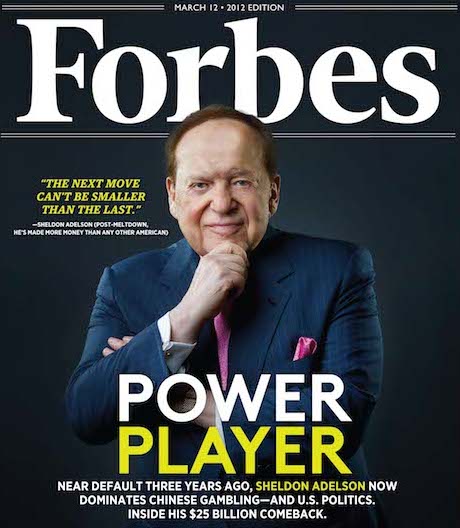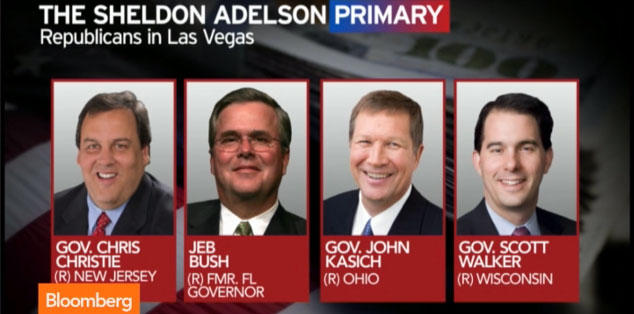In Washington, those with real power often speak softly and carry a big wallet. That can be said for Sheldon Adelson, the billionaire casino magnate who rose to fame in 2012 after spending $92 million financing GOP presidential candidates.
By the way, given his $38 billion fortune, that would be the equivalent of a few hundred bucks for the average Joe. Now, the GOP mega donor is back to flexing his monetary muscle in Washington, this time spending millions on his personal crusade to ban online betting.

As with any crusade, Adelson has turned his fight into a moral cause, a match between good and evil.
Adelson, who owns the Las Vegas Sands Corporation, calls on-line gambling ‘fools gold’ and ‘a societal train-wreck waiting to happen’ in a Forbes op-ed.
He warns that online gambling is bad for casinos and bad for gamblers. “Click your mouse and lose your house.”
Last Wednesday, after a year of bankrolling an unlikely coterie of lobbyists, PR specialists, and former lawmakers, Adelson’s efforts paid off.
Republican Congressman Jason Chaffetz and Senator Lindsey Graham introduced Restoration of America’s Wire Act (H.R. 4301).
The bill would restore The Wire Act, a federal law that banned on-line gambling until 2011 when the department of justice flip-flopped.
If passed, HR 4301 would shut internet gambling in the three states that recently legalized it, Delaware, Nevada and New Jersey.
It’s All about the Family Money
Conservative Republicans who oppose gambling make up the base of supporters for HR 4301, along with a handful of Democrats who are wary of under-aged gambling.
Texas Governor Rick Perry raised issues of regulation in a letter to Congress, stating that online gambling “seriously compromises the ability of states to control gambling within their borders.”
South Carolina Governor Nikki Haley threw her weight behind family values. “Allowing Internet gaming to invade the homes of every American family, and to be piped into our dens, living rooms, workplaces, and even our kids’ bedrooms and dorm rooms, is a major decision.”
Opponents of internet gaming have a solid point. For instance, under-aged gambling will be as inevitable as under-aged smoking. (Though, as is the case with Big Tobacco, the casino industry will welcome addicted teens with open arms) And in an age where tech-savvy criminals are always one step ahead of the government, online casinos will be impossible to fully regulate.
Even still, Adelson is not spending millions to help hapless teens and government regulators.
Sheldon Adelson is not out to protect anyone from the tragic outcomes of compulsive behavior. That would be about as hypocritical as a drug dealer teaching D.A.R.E. Like most ideological fights in Washington, this one too is rooted in money, not morality.
Investment banking firm Morgan Stanley predicts that online gambling could be worth $8 billion per year by 2020, approximately 12 percent of overall gambling revenues nationwide. But those revenues will likely come at the expense of many brick-and-mortar establishments, including the Adelson-owned Venetian which relies more heavily on it’s casino to draw patrons, than its resort designation.
This is why Adelson’s fight has largely divided the casino industry along economic lines. Major casino operators like Caesars and MGM see expansion into the digital realm as a way to hook a new generation of gamblers and increase revenue. Game equipment and software firms see online gambling as a new lucrative market. State governments see it as a way to boost stagnant casino revenues.
But not everyone will come out on top. Many local and Native-American owned casinos, venues without a fully developed a resort experience, stand to lose.
Keep Calm and Gamble On
The billionaire octogenarian wants to shield his empire from the cataclysmic change the internet inflicted on just about every other national industry. Still, analysts don’t expect the bill to go far. Considering the public’s ambivalence about online-gambling, Congress may not even bring the measure to a vote this year. But for Adelson, HR 4301 is an exercise in power more than anything, a means of seeing just how much power his fortune can buy.
In February 2012, Adelson told Forbes magazine that he is “against very wealthy people attempting to or influencing elections. But as long as it’s doable I’m going to do it. Because I know that guys like Soros have been doing it for years.”
Adelson continues to prove that he’s more than comfortable using his money as a ‘big stick’. Most people involved with the HR 4301 are somehow indebted to the casino owner. He donated tens of thousands of dollars to Senator Graham, the bill’s sponsor, who also happens to be up for re-election. He bankrolled the “Coalition to Stop Internet Gambling” and his lobbyist authored the original draft.

And perhaps the ultimate display of his influence occurred this past weekend when four potential GOP presidential candidate, including NJ Governor Chris Christie and Florida’s Jeb Bush, traveled to Las Vegas for an event the media coined the “Adelson-Primary”. The Republican Jewish Coalition’s annual conference took place at the Adelson-owned Venetian hotel and casino where his presence loomed large. All four hopefuls had the opportunity to woo the man who could single-handedly bankroll an entire presidential bid.
Adelson has said that he is prepared to spend upwards of 100 million dollars to back a mainstream Republican candidate and you can bet that candidate will represent Adelson’s interest, gambling measures included.
I’d wager that on-line gambling is safe for now. Still, HR 4301 should be alarming, to gamblers and non-gamblers alike, because it speaks to the growing power of billionaires, like Soros and Sheldon, to single-handedly influence political decisions. And that, to use Sheldon’s own words, is the real “societal train wreck waiting to happen”.





